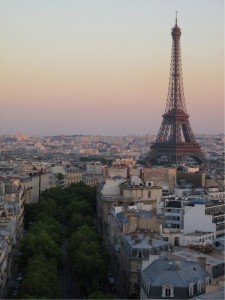Posts Tagged ‘travel’
Fragments of a Whole Being Belonging
I belong to Air Canada.
In this moment. January 2020.
Buckled into Seat 14C.
Far above where birds take flight. The place where dreams alone can live.
In this moment, I belong to this unbounded world above the clouds. A creature of the air.
This air-borne liberation is a mirage.
I know my feet belong on the ground. A creature of the earth.
I am on a flight to Montreal to visit friends. Their relocation to this city will bring me back again and again because our friendship is long standing and we will nurture it. My friends have also made me belong to Montreal again.
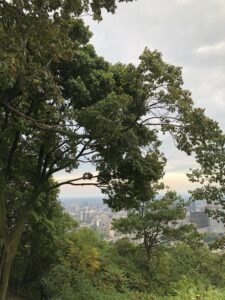
Again, because this is the city where my parents met. Where I was born, but never lived in for long. What part of me, then, belongs here? Belongs to this city where I speak the language only to a moderate level of fluency? Because all of me would not be if it weren’t for this city.
But countries and cities pull at me from all different directions.
Jamaica – my mother’s birthplace. Lebanon – my father’s. Kuwait – where my sister was born. Calgary – where my youngest sister was born. And Vancouver where we settled in 1974 and where my family has stayed since. All of us have ventured afar over the years, whether alone or together, to travel or to live for fragments of time. Toronto – where I lived for six years.
My whole being is a mosaic of spaces, places, and time. Of different cultures and societies. I identify with all of them and I identify with none of them. I am rooted in my experiences with each and am unrooted because I do not feel like I wholly belong in any of them.
They have all shaped me as have other cities I’ve visited, especially those that feel as if they are the locations where I ought to be, where I yearn to be.
In Montreal, my friends and I go to a movie they want to share with me. Their second viewing, my first.
Antigone (in French, Canada, 2019). Sophie Deraspe’s screenplay and her direction. Based on the Ancient Greek play by Sophocles. A play I know. A play that belongs to me because I have studied it, absorbed it, discussed it, taught it, remember it.
This film, this Antigone, which now belongs to me, too, tells the story of an immigrant family to Canada. Two girls, two boys, and a Grandmother, haunted by the memories of the children’s parents murdered in Algeria, in the country that they once belonged to.
In this country, this foreign Canada, do they belong?
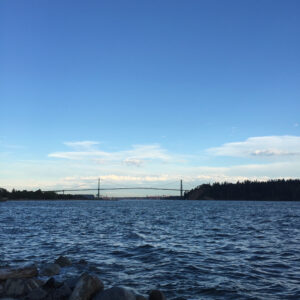
Ismène, the older girl, has built a successful career as a hair stylist. The grandmother cooks, cleans, loves each child ferociously. Antigone is fearlessly devoted to the family, to their story, to their truth. In an address to her class, “une exposition,” she elevates her classmates from a state of boredom, heads on the desk, eyes rolling, to whip-straight postures, eyes that pierce through teenage school inertia. Her story of survival, loss, and grief lures them to listen.
Antigone’s two brothers? Étéocle and Polynice? The fierce family love envelops the two brothers and yet they search for belonging elsewhere.
Why isn’t their family enough?
And why do men so often find belonging in violence, especially vulnerable men?
The story of this dislocated, relocated family unravels in flashbacks and in real time. Antigone’s knowledge of her brothers, the appearance of their being and belonging, is contradicted by the reality she grasps in hindsight.
She remembers a night. Polynice creeps home late, after dark. He opens the fridge door, she startles him in the kitchen. He stands in the shadows, the pale light casting an eerie halo around him. Bruised, bloodied, black-eyed, he exults to his sister “I’m in,” “I’m in.”
In what? In toxic brotherhood? In a position to provide for his family now? In hopelessness? In power? In control, as illusory as that power and control may be?
Polynice is not a lone wolf. What he decides matters. It affects him, his brother, his sisters, his grandmother, his community. But he makes choices as if he were alone. Is his choice a resistance to belonging to this family or is it his way to belong more meaningfully?
His choice is made as if he were an island. But no person is an island.
As much as we may long for separation, for isolation. Long to escape duties, obligations, chores, stress, news, disasters, worries, fears. But a hermetic existence is possible for only a few, it is life’s answer or life’s purpose for even fewer.
Most of us, the vast majority, need – crave – connection. We are social creatures. Socialized creatures. We achieve our potential by being a part of a world wide web and I do not mean losing ourselves in the emptiness of cyberspace or discarding hours of our life on the internet.
We want to belong. We are part of a world of belonging.
We recognize that we are as others are. Lost, found, lonely, together, alive, dying, needy, giving, angry, happy, sad, joyful, cruel, kind, hateful, loving, powerful, powerless, smart, stupid, healthy, sick, caring, selfish, playful, serious, studious, ignorant, ambitious, lackadaisical, safe, unsafe, privileged, oppressed, worried, carefree, careful, careless, faithful, faithless, believing, unbelieving. Free, not free.
Isolation, being alone, is a desire, a fantasy, as is belonging. The former is a choice, the latter inescapable. We are compelled into connection. We are born into a web of connections.
We have to negotiate with ourselves as much as with others. We negotiate with life, with experiences. And despite this we are often unprepared for what life throws at us.
Perhaps there is a toxic underpinning to the idea of belonging. After all, embedded in the word “belong” is the idea of ownership. My husband, my wife, my spouse, my daughter, my son, my child, my father, my mother, my parents, my sister, my brother, my siblings, my niece, my nephew, my uncle, my aunt, my grandparents, my cousins, my relatives, my friend, my colleague, my acquaintance, my pet, my community, my neighbourhood, my job, my school, my work, my career, my money, my dreams, my aspirations, my humour, my loss, my grief, my beliefs, my body, my pain.
Would we be better served by leaving belonging to refer to objects? When we talk about humans, living creatures, plants, trees, the earth and the webs of existence in which we’re enmeshed, would it be better use other verbs: “connect,” “embrace,” “cherish,” “know,” “love”? I connect with this city; this city connects with me. This family embraces me; I embrace this family. These friends cherish me; I cherish these friends. I know that person; that person knows me. You love me; I love you.
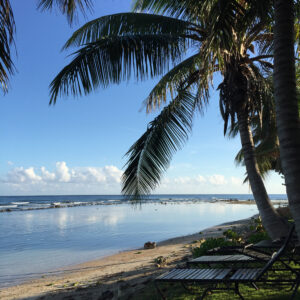
Words alone will not remake belonging. We need to excavate the purpose, the meaning, the appeal, the allure, the temptation of belonging.
Why do we care about belonging? Why do we need to belong?
Where do we belong? To whom do we belong?
Where do I belong? To whom do I belong? Who belongs with me, to me?
I think we can only remake belonging if we learn to transcend the boundaries of belonging and not belonging. To embrace the ambiguity and uncertainty of embodying different states and ways of being. To be unbounded. To imagine our lives as bigger than what we can see, hear, touch, taste, and smell. Bigger than our dreams, bigger than our imaginations.
Bigger than our communities of “same as me.”
As big as our hearts.
Because we belong nowhere and everywhere.
I belong nowhere and everywhere.
I may live in Vancouver, but fragments of me are dispersed. Unless I identify with everywhere, I can’t care about the world, the environment, the fragile state of humanity’s existence.
We belong to nothing and everything.
I belong to nothing and everything.
Because I am not beholden or enthralled by a particular thing or person and yet I am curious about all the world has to offer.
We belong to no one and everyone.
I belong to no one and everyone.
Because I am not an object to be owned and yet I am human as you are human, as he is human, as she is human, as they are human, as the many are human.
This heart belongs to those I love, but not as a thing for them to own.
It is a gift that says they are valued and valuable.
This soul is untethered in a state of un-belonging.
The essence of me is free.
The Question Of Home And Away
After two months of travel, you’d think I’d long for home.
Yes. And no.
Home, I think, is the place where we feel most fully ourselves. Or at least that’s the concept of home which we idealize whether that encompasses the geography, the culture, and the people of a specific place. More accurately, it likely encompasses all of these elements and more.
Vancouver’s been my home since I was twelve and the more I travel, the more I appreciate how lucky I am to have lived most of my life here. Not only is it blessed with a temperate climate – I’ve missed most of this dismal summer according to the reports I’ve received – but our setting, encircled by mountains and ocean is brilliantly uplifting.
We have greenery, we have space, we have clean air to breathe – in general – and we have clear water to drink. We have a diversity of cultures that makes you feel part of the world at the same time that you feel free to be yourself.
And yet, when I travel, I wonder if I have found my home. Is the appeal of the away for me simply the distance from the inertia and demands of day-to-day life as a mother, a student, a teacher, a homemaker, an elected official? Or is there a deeper resonance in Europe to who I am as an individual? Is what I feel simply an echo of what everyone else feels when they travel or is this a particular issue for me?
And while this may seem to you to be no more than navel-gazing, it is potentially the theme of what I will be proposing for the MA thesis which I’m scheduled to begin this September.
The first trip I took on my own was in 1983 to Greece following the completion of my BA degree at UBC. This current expedition, which is scheduled to wrap up in four days, represents another installment in a three-decade serial of travel experiences. Trips I’ve taken on my own, with friends, with family, as a single, as one of a couple, as a mother and an aunt. From my early twenties till now.
That’s a lot of territory to cover both in terms of chronology and experience as well as personal growth and development.
I don’t know if travel has made me a better person, a different person, a less-rooted person, or if its simply been a privilege to be away. Fun, interesting, exciting, but fleeting with no lasting effect aside from leaving me with a lifetime of memories and stories with which to bore my acquaintances and relatives.
I’m not sure I’ll ever be able to answer that although I think it’s likely, at some point, that I will live abroad for an extended time in order to explore these questions further and maybe develop a more secure sense of who I am and my place in the world.
A place I might call home which, in the end, may not prove to be geographic at all but really just a state of mind.
The Appeal Of Zigzagging
According to the Austrian Airlines magazine, the flight time from Vienna to Lyon is one hour and thirty-five minutes. It took us six hours to cover the distance.
Why?
You may or may not be familiar with the term shadow work, but it’s described in this New York Times article (http://www.nytimes.com/2011/10/30/opinion/sunday/our-unpaid-extra-shadow-work.html?pagewanted=all). One area in which many of us have taken on the tasks we used to entrust to others is travel planning. We search the web for the best deals, we read sites dedicated to sharing travel tips, we peruse blogs, we devour newspaper and magazine articles, and we imagine that we can do better than the professionals.
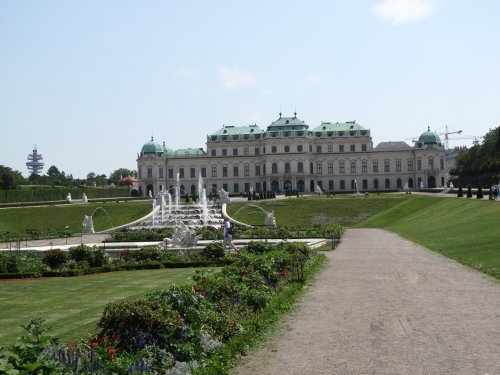
In preparing for my trip this summer, I did the same. I spent hours and made my own reservations whether with airlines and hotels directly or through travel sites. I was certain that I would be able to find a direct flight from either Vienna or Budapest directly to Lyon. I only needed to fly the one way and try as I might and despite time spent searching, the only direct flights I could find for the three of us were ridiculously expensive.
Given the prevailing wisdom that I should be able to do this on my own, I did not check with a travel agency nor with a travel agent. Somehow we seem to think we’ll be able to unearth the best deals ourselves although I find that feeling elusive.
At the point at which I thought I would throw my computer out the window, I checked Orbitz. Although I’d never used the service before, I thought I’d take a chance and booked the flights I found. From Vienna to Berlin, Berlin to Lyon with a couple hours at the airport and a very early departure time.
The pain of a 4:45 a.m. wake up call was eased by the efficiently generous staff at the Kaiserhof Hotel in Vienna, who prepared a light breakfast for us despite the early hour, and the ability to check our bags straight through. Our flight, booked on Lufthansa but operated by a partner airline, landed at Tegel Airport in Berlin – a change which I’d been notified of by Orbitz – on time and we looked around for a spot to hang out until it was time to fly again.
Having bought some refreshments, I was complaining about the prices charged when a woman at a neighbouring table spoke up in English about the cost of food for captive transfer passengers.
A conversation broke out with a fellow traveller, a Canadian from Winnipeg, who shared the story of her travels and journey with us. The time, to use a cliché, flew by and before I knew it we were on the final leg of the journey.
That zig-zag, that diversion, made the ridiculous plan I’d hatched worth it. It was a connection, a human connection which emphasized why I hope no matter how much shadow work we unknowingly take on, we’ll never lose the skill of talking with one another.
The Eternal City and Eternity
When Shelley was in Byron’s company, he seemed to stop writing. Why? We can only speculate, but I think it’s partly because Byron’s larger-than-life persona and success as a published poet made Shelley feel small. That collapse into one’s self is not conducive to imaginative flights of fancy and surrendering to the creative spirit.
I’m using that as an analogy for what Rome has done to me and to explain my lack of productivity while here in the Eternal City.
For those of you who are friends on Facebook or follow me on Twitter (@rmfaris), you’ll know that I’ve been in Italy since late May. The first four weeks of my time here was as a registered student in LS 819 – “Landscape, Politics, and Poetry: English Romantics in Italy”, a travel study course offered by Simon Fraser University’s (SFU) Graduate Liberal Studies (GLS) Department. Our reading list included Rousseau, Goethe, and biographies of the poets, but the main focus was the work of Byron and Shelley.
We followed in the footsteps of these two poets, who spent their last years in Italy, by visiting cities they had lived in and enjoyed such as Venice, Florence, Pisa, Bagni de Lucca, Ravenna, and — of course — Rome where our course ended. We also veered off the path to visit cities such as Orvieto, Arezzo, and Assisi as well as many other wonderful Tuscan and Umbrian destinations.
While my colleagues in this adventure have returned home, I lingered in Rome and have now transitioned into summer holidays. I’ll be joined by family members tomorrow and we’ll be spending more time exploring this part of the world.
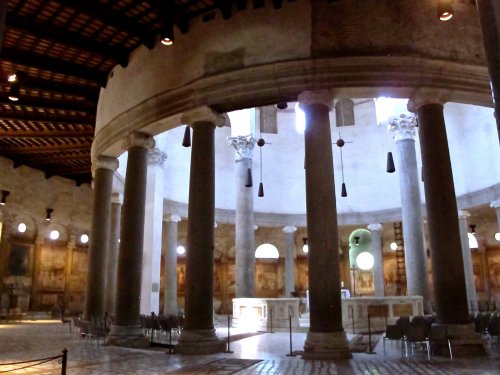
Rome is brash, bold, loud, chaotic, teeming with tourists, densely populated, hotter than Hades, ancient, new, crumbling, emergent, fascinating, intimidating, layered, in your face, colourful, irreverent, faith-based, and intriguing.
Being here brings you face-to-face, more so than in Vancouver, with issues of faith and belief. This connects to one of the themes which has occupied my interest since becoming a GLS student in 2010. Because the GLS program is largely focused on Western Civilization, you cannot avoid dealing with faith, religion, and particularly the Roman Catholic church because of the dominant position the Church has held in the evolution of the West – culturally, artistically, politically, and socially.
My studies, interestingly enough, have led me towards a greater tolerance and emerging personal understanding of religion and the positive aspects it may offer to believers. I still feel conflicted though because I cannot accept the point at which religion devolves into an exclusionary ideology of “I have the answer, I am right, you don’t believe as I do, therefore you are wrong and evil” which I believe underlies the negative consequences of the implementation and practice of religion through the ages.
In Rome, religion is everywhere you look, it is embedded – I believe – in the very DNA of the city and its citizens. And while I may feel awed stepping into the hushed cavern of yet another spectacular building dedicated to celebrating this faith, I feel bewildered at policies which in this modern age demand celibacy of its “managers”, sanction against contraceptives, and demonize homosexuality.
And while I embrace complexity in life, I wish the path to understanding eternity in the Eternal City was not so convoluted and confusing.
